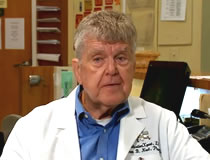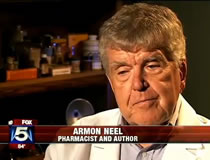August 12th, 2012
Hawkes Library Book Signing
Every time I get in front of a group of folks I’m encouraged about taking the time to write the book. Bill Hogan was right — I do have a lot of life-saving information to get out to people who need it. The degree of confidence that many people have in their physicians to be fully educated and informed about the drugs they prescribe just scares me to death. Now, I’m not throwing rocks at doctors at all. I know that they’re fantastically trained in the diagnosis and treatment of disease, but I’m continually disappointed in their lack of knowledge about body chemistry, particularly when it comes to older patients, and the drugs they prescribe are affected by body chemistry. It’s just like a neon sign flashing, “Let the second-most-trained health professional, the clinical pharmacist, take care of the drug therapy management of the patient . . . PLEASE!”
I was at a book signing yesterday at our local library. The library had invited all the authors in and around Griffin to talk about their books and then to sign books for anyone who might want to buy them. In the course of the day I had lots of people come up to tell me how smart their doctor was and how well they were taking care of their problems. Most would describe their conditions and their drugs in some detail, and to my dismay every one of them was mismedicated. Some of the drugs were so wrong that I had to tell them to take the book straight home and read it carefully and make an appointment with their doctor to discuss the problem with them.
One 80 year old lady came over to tell me how she didn’t need a book like mine because she was going to a brilliant doctor who also teaches at the medical school in Atlanta three days a week. She said she had type 2 diabetes and was taking a drug, Lisinopril, to keep protein from building up in her kidneys, and a heart-rhythm drug, Metoprolol, to keep her heart beating smoothly.
I was floored, and didn’t know what to do. But I decided to go ahead and say: “At your age your kidneys can’t tolerate the Lisinopril. You don’t have enough renal clearance for the drug to work as intended, so it will cause you to have intestinal angioedema. Your throat will swell and you‘ll develop a non-productive severe cough. That’s caused by the insoluble kinins that don’t filter out in the kidneys and migrate and attach to the bronchial tubes. The severe cough is the body trying to expel them.”
She looked at me real funny like and said, I’m having that, and he’s been treating it as a sinus problem.”
“Well, that’s not your problem, and since your throat is swelling it can close and cause you to suffocate,” I told her. “ And the Metoprolol is not a very friendly drug for the older patient. It will lead to you becoming depressed and having real bad nightmares.”
Again she look startled. “I’ve been having those problems for about a year,” she said, “and the doctor told me it was just because I was getting too old.”
Well, as you may have guessed, she did buy a book. I could go on and on about the stories I heard that day and about how discouraged they made me feel about the whole health-care system. But thank God that I let Bill talk me into putting these words out in a book to help all these people — not for the sale of the book, but the health of my fellow man I wish I could get Are Your Prescription’s Killing You? into every person’s hands. I’d really love to know just how many lives it would help to save.
- November 27th, 2012
Patients Forget How to Use EpiPen After 3 MonthsRead - June 3rd, 2014
(FINALLY) STOPPING STATINS MAY BENEFIT TERMINALLY ILL PATIENTSRead - November 13th, 2012
Dangerously Low Calcium with a Cancer, Osteoporosis DrugRead - November 7th, 2014
Experts Update Stroke Prevention GuidelinesRead - September 22nd, 2012
Thalidomide Relieves Cough in Pulmonary FibrosisRead
Geriatric Nutrition
Without good nutrition, positive drug therapy outcomes are very difficult to obtain, For the best in Geriatric Nutritional Information
Find out more Optima SolutionsContinuing Education
Each month we will post an analysis of specific aspects of government long-term healthcare regulations.
Find out more


